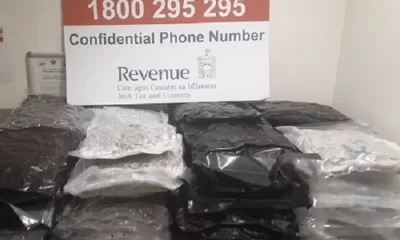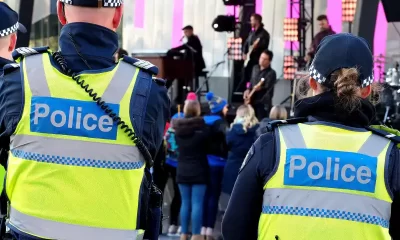Business
More Than 1,000 Arrested in Sweep of U.K. Weed Grows

A recent campaign to eradicate cannabis cultivation in the U.K. netted more than 180,000 plants and resulted in the arrest of more than 1,000 people.
Police in the United Kingdom arrested more than 1,000 individuals and confiscated more than 180,000 cannabis plants in a recent push to crack down on illegal marijuana cultivation. The eradication campaign, dubbed Operation Millie by U.K. law enforcement officials, was carried out throughout the month of June and involved every police force in England, Scotland and Wales, according to media reports.
Steve Jupp, the National Police Chiefs’ Council (NPCC) lead for Serious and Organized Crime, told reporters that the operation had “successfully disrupted a significant amount of criminal activity.”
Operation Millie was the largest cannabis eradication campaign to date, with more than 11,000 police officers across the U.K. participating in the month-long drive. The National Crime Agency and Immigration Enforcement were also involved in the operation, which saw the execution of more than 1,000 warrants during the month of June. Of the more than 1,000 arrested, 450 have since been charged with an offense.
In addition to the nearly 200,000 cannabis plants seized during Operation Millie, police also confiscated 15 to 20 firearms, approximately 40 other weapons and £650,000 ($825,000) in cash. Police estimated the value of the cannabis plants seized at £130 million, although some have suggested that such estimates from law enforcement are often inflated.
Raids Targeted Criminal Gangs
Police said that the operation was carried out not only to eradicate illicit cannabis cultivation sites but also to disrupt organized criminal gangs that use the money generated by the operations to fund other criminal activities. Other offenses committed by such gangs include money laundering, violence and trafficking in Class A drugs, all of which are offenses that “blight communities,” according to the NPCC. In the U.K., cannabis is designated a Class B drug, while more potentially addictive and dangerous substances such as heroin are listed as Class A drugs.
“We know that organized networks involved in cannabis production are also directly linked to an array of other serious criminality such as Class A drug importation, modern slavery and wider violence and exploitation,” said Jupp.
Police said that illicit cannabis growers have used structures of various sizes to house their operations, noting that illegal weed farms have been found in a range of buildings from empty residential homes to large industrial complexes. Often, the sites are dangerous because the operators are stealing electricity, posing a risk of fire. Locations can also be subject to water damage and strong fumes.
“This operation not only successfully disrupted a significant amount of criminal activity, but the intelligence gathered will also help inform future law enforcement across the country,” Jupp said. “Cannabis-related crime is often thought to be ‘low level’, however, there are clear patterns around the exploitation and violence organized crime groups are using to protect their enterprises. We also frequently find that cannabis production is just one aspect of their criminal operations and that they are complicit in wider offending which blights our communities.”
U.K. Police Chiefs Call For Drug Decriminalization
Late last year, the NPCC announced that the group is developing a plan to effectively decriminalize the possession of drugs including cannabis and cocaine. If adopted by the government, the use and possession of small amounts of recreational drugs would be treated as a public health issue for first-time offenders, rather than a criminal offense subject to prosecution and jail time or other punishment.
The proposals, which were developed by the NPCC and the College of Policing, would effectively decriminalize the possession of Class A drugs including cocaine and Class B substances such as marijuana. Under the plan, individuals caught with illegal drugs would be offered an opportunity to attend drug education or treatment programs, rather than being subjected to prosecution.
Police would take no further action against those who agree to complete the program, giving them a chance to avoid a criminal record. Those who fail to finish the drug program or who are subsequently caught with illicit drugs would still be subject to criminal prosecution.
Jason Harwin, the former NPCC lead on drugs and a former deputy chief constable, is working with the College of Policing on the new partial decriminalization strategy.
“We should not criminalize someone for possession of drugs,” he said in a statement reported by The Telegraph. “It should be diversion to other services to give them a chance to change their behaviors.”
Fourteen of the U.K.’s 43 police forces have already adopted policies similar to the drug decriminalization proposal from the nation’s police chiefs. But the plan is at odds with the country’s Conservative Party government, which has floated proposals to stiffen the penalties on recreational drugs including cannabis.
Source: https://hightimes.com/news/more-than-1000-arrested-in-sweep-of-u-k-weed-grows/
Business
New Mexico cannabis operator fined, loses license for alleged BioTrack fraud

New Mexico regulators fined a cannabis operator nearly $300,000 and revoked its license after the company allegedly created fake reports in the state’s traceability software.
The New Mexico Cannabis Control Division (CCD) accused marijuana manufacturer and retailer Golden Roots of 11 violations, according to Albuquerque Business First.
Golden Roots operates the The Cannabis Revolution Dispensary.
The majority of the violations are related to the Albuquerque company’s improper use of BioTrack, which has been New Mexico’s track-and-trace vendor since 2015.
The CCD alleges Golden Roots reported marijuana production only two months after it had received its vertically integrated license, according to Albuquerque Business First.
Because cannabis takes longer than two months to be cultivated, the CCD was suspicious of the report.
After inspecting the company’s premises, the CCD alleged Golden Roots reported cultivation, transportation and sales in BioTrack but wasn’t able to provide officers who inspected the site evidence that the operator was cultivating cannabis.
In April, the CCD revoked Golden Roots’ license and issued a $10,000 fine, according to the news outlet.
The company requested a hearing, which the regulator scheduled for Sept. 1.
At the hearing, the CCD testified that the company’s dried-cannabis weights in BioTrack were suspicious because they didn’t seem to accurately reflect how much weight marijuana loses as it dries.
Company employees also poorly accounted for why they were making adjustments in the system of up to 24 pounds of cannabis, making comments such as “bad” or “mistake” in the software, Albuquerque Business First reported.
Golden Roots was fined $298,972.05 – the amount regulators allege the company made selling products that weren’t properly accounted for in BioTrack.
The CCD has been cracking down on cannabis operators accused of selling products procured from out-of-state or not grown legally:
- Regulators alleged in August that Albuquerque dispensary Sawmill Sweet Leaf sold out-of-state products and didn’t have a license for extraction.
- Paradise Exotics Distro lost its license in July after regulators alleged the company sold products made in California.
Golden Roots was the first alleged rulebreaker in New Mexico to be asked to pay a large fine.
Source: https://mjbizdaily.com/new-mexico-cannabis-operator-fined-loses-license-for-alleged-biotrack-fraud/
Business
Marijuana companies suing US attorney general in federal prohibition challenge

Four marijuana companies, including a multistate operator, have filed a lawsuit against U.S. Attorney General Merrick Garland in which they allege the federal MJ prohibition under the Controlled Substances Act is no longer constitutional.
According to the complaint, filed Thursday in U.S. District Court in Massachusetts, retailer Canna Provisions, Treevit delivery service CEO Gyasi Sellers, cultivator Wiseacre Farm and MSO Verano Holdings Corp. are all harmed by “the federal government’s unconstitutional ban on cultivating, manufacturing, distributing, or possessing intrastate marijuana.”
Verano is headquartered in Chicago but has operations in Massachusetts; the other three operators are based in Massachusetts.
The lawsuit seeks a ruling that the “Controlled Substances Act is unconstitutional as applied to the intrastate cultivation, manufacture, possession, and distribution of marijuana pursuant to state law.”
The companies want the case to go before the U.S. Supreme Court.
They hired prominent law firm Boies Schiller Flexner to represent them.
The New York-based firm’s principal is David Boies, whose former clients include Microsoft, former presidential candidate Al Gore and Elizabeth Holmes’ disgraced startup Theranos.
Similar challenges to the federal Controlled Substances Act (CSA) have failed.
One such challenge led to a landmark Supreme Court decision in 2005.
In Gonzalez vs. Raich, the highest court in the United States ruled in a 6-3 decision that the commerce clause of the U.S. Constitution gave Congress the power to outlaw marijuana federally, even though state laws allow the cultivation and sale of cannabis.
In the 18 years since that ruling, 23 states and the District of Columbia have legalized adult-use marijuana and the federal government has allowed a multibillion-dollar cannabis industry to thrive.
Since both Congress and the U.S. Department of Justice, currently headed by Garland, have declined to intervene in state-licensed marijuana markets, the key facts that led to the Supreme Court’s 2005 ruling “no longer apply,” Boies said in a statement Thursday.
“The Supreme Court has since made clear that the federal government lacks the authority to regulate purely intrastate commerce,” Boies said.
“Moreover, the facts on which those precedents are based are no longer true.”
Verano President Darren Weiss said in a statement the company is “prepared to bring this case all the way to the Supreme Court in order to align federal law with how Congress has acted for years.”
While the Biden administration’s push to reschedule marijuana would help solve marijuana operators’ federal tax woes, neither rescheduling nor modest Congressional reforms such as the SAFER Banking Act “solve the fundamental issue,” Weiss added.
“The application of the CSA to lawful state-run cannabis business is an unconstitutional overreach on state sovereignty that has led to decades of harm, failed businesses, lost jobs, and unsafe working conditions.”
Business
Alabama to make another attempt Dec. 1 to award medical cannabis licenses

Alabama regulators are targeting Dec. 1 to award the first batch of medical cannabis business licenses after the agency’s first two attempts were scrapped because of scoring errors and litigation.
The first licenses will be awarded to individual cultivators, delivery providers, processors, dispensaries and state testing labs, according to the Alabama Medical Cannabis Commission (AMCC).
Then, on Dec. 12, the AMCC will award licenses for vertically integrated operations, a designation set primarily for multistate operators.
Licenses are expected to be handed out 28 days after they have been awarded, so MMJ production could begin in early January, according to the Alabama Daily News.
That means MMJ products could be available for patients around early March, an AMCC spokesperson told the media outlet.
Regulators initially awarded 21 business licenses in June, only to void them after applicants alleged inconsistencies with how the applications were scored.
Then, in August, the state awarded 24 different licenses – 19 went to June recipients – only to reverse themselves again and scratch those licenses after spurned applicants filed lawsuits.
A state judge dismissed a lawsuit filed by Chicago-based MSO Verano Holdings Corp., but another lawsuit is pending.
Source: https://mjbizdaily.com/alabama-plans-to-award-medical-cannabis-licenses-dec-1/
-

 Business2 years ago
Business2 years agoPot Odor Does Not Justify Probable Cause for Vehicle Searches, Minnesota Court Affirms
-

 Business2 years ago
Business2 years agoNew Mexico cannabis operator fined, loses license for alleged BioTrack fraud
-

 Business2 years ago
Business2 years agoAlabama to make another attempt Dec. 1 to award medical cannabis licenses
-

 Business2 years ago
Business2 years agoWashington State Pays Out $9.4 Million in Refunds Relating to Drug Convictions
-

 Business2 years ago
Business2 years agoMarijuana companies suing US attorney general in federal prohibition challenge
-

 Business2 years ago
Business2 years agoLegal Marijuana Handed A Nothing Burger From NY State
-

 Business2 years ago
Business2 years agoCan Cannabis Help Seasonal Depression
-

 Blogs2 years ago
Blogs2 years agoCannabis Art Is Flourishing On Etsy











